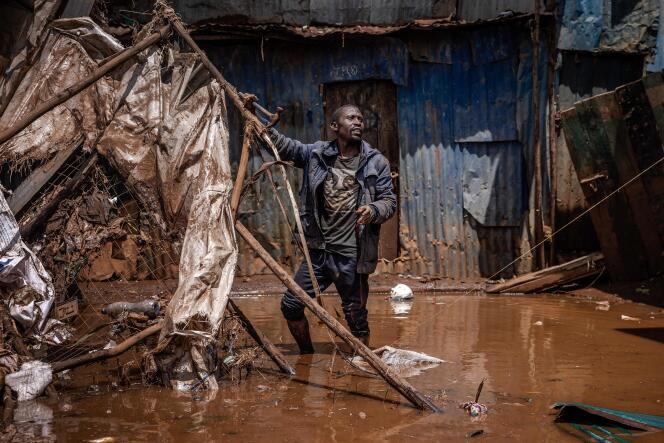
After the worst drought in four decades, torrential rains hit Kenya, plunging vast parts of the country into chaos. On Monday, April 29, the bursting of a natural dam in the foothills of Old Kijabe, some 100 km northwest of Nairobi, claimed 45 lives, bringing the national death toll to 120. Material damage was considerable: broken bridges, washed-out roads, destroyed houses... Some 200,000 people have been affected by the floods, according to provisional figures.
In neighboring Tanzania, the situation is just as dramatic. Coastal areas and the economic capital, Dar es Salaam, are partly underwater. The government has counted 155 victims. Further north, Lake Tanganyika – the continent's second-largest freshwater body – and its tributaries are overflowing. Nearly 100,000 people in Burundi have been displaced.
Everywhere, the same scenes of desolation are seen, with stunned families who, in the space of a few hours, have lost all their possessions and sometimes some of their loved ones. With no insurance to help them, they are at the mercy of humanitarian or governmental interventions, whose funding is far from guaranteed. These climate catastrophes are nothing new. But their frequency and violence have increased.
In March 2023, in Malawi, Cyclone Freddy – the longest cyclone in meteorological history and one of the deadliest in this landlocked southern African country – hit populations that had suffered two successive cyclones a year earlier, some of whom were still taking refuge in displaced persons camps. One crisis follows on the heels of another, leaving behind lasting consequences and the psychological certainty that the nightmare could start all over again at any moment.
'The priority remains saving bodies, not minds'
The trauma caused by the brutality of these events, and the feeling of vulnerability in the face of the future that they create, have so far received little or no attention in climate disaster response programs. Fabrice Weissman, who was the head of operations for Médecins sans Frontières (MSF) in Malawi at the time of Cyclone Freddy, said, "In an emergency and with the limited resources at our disposal, the priority remains saving bodies, not minds." At UNICEF's French office, Mathilde Lécluse made the same observation: "The worsening of malnutrition and the appearance of epidemics, particularly cholera, are the two major risks linked to flooding and are where we are concentrating our actions."
Yet this hidden face of the climate crisis is worrying the World Health Organization (WHO). In a 2022 policy brief aimed at governments, it stressed the "growing emergency" of preparations to prevent mental health issues linked to climate disruption. "The IPPC revealed that rapidly increasing climate change poses a rising threat to mental health and psychosocial well-being; from emotional distress to anxiety, depression, grief, and suicidal behavior," stated the brief, referring to a report by the Intergovernmental Panel on Climate Change (IPCC). The WHO's official definition of "mental health" is "a state of well-being in which every individual realizes his or her own potential, can cope with the stresses of life, can work productively and fruitfully and is able to make a contribution to her or his community."
You have 46.75% of this article left to read. The rest is for subscribers only.